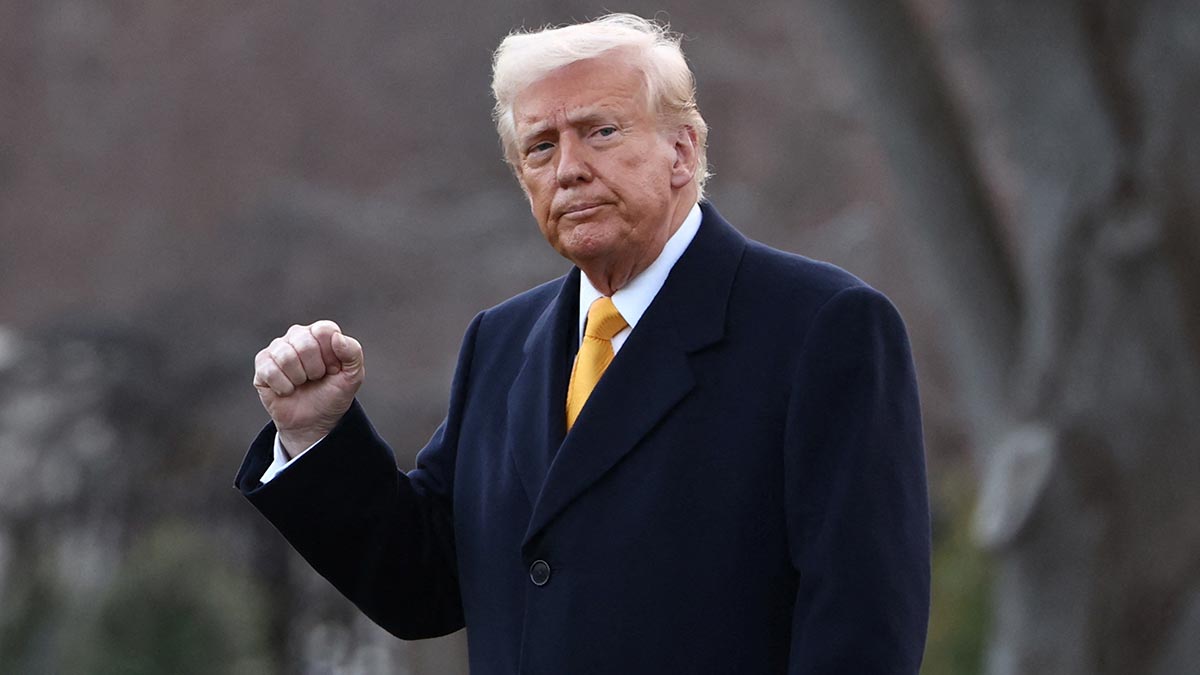US and Iran to resume nuclear talks next week, provided Trump refrains from military action during negotiations
 Fun with Don: US President Donald Trump is his own biggest fan, so he has a treat coming his way. He gets to watch himself on TV pointing at contestants and drawling, “You’re fired”. Amazon Prime Video recently made available the first season of Trump’s hit series The Apprentice, which premiered on NBC in 2004. The subsequent six seasons will be released every week through April 27. “I look forward to watching this show myself—such great memories, and so much fun, but most importantly, it was a learning experience for all of us,” said Trump. It was entertaining to watch him fire others, but now that he’s president, it’s unsettling that he could turn his ire on you. The trump on your tv was much more fun than the trump in the white house | Reuters
Fun with Don: US President Donald Trump is his own biggest fan, so he has a treat coming his way. He gets to watch himself on TV pointing at contestants and drawling, “You’re fired”. Amazon Prime Video recently made available the first season of Trump’s hit series The Apprentice, which premiered on NBC in 2004. The subsequent six seasons will be released every week through April 27. “I look forward to watching this show myself—such great memories, and so much fun, but most importantly, it was a learning experience for all of us,” said Trump. It was entertaining to watch him fire others, but now that he’s president, it’s unsettling that he could turn his ire on you. The trump on your tv was much more fun than the trump in the white house | Reuters
The United States and Iran are expected to resume stalled nuclear talks in Oslo next week, in what would be the first formal engagement between the two sides since Israel’s 12-day war with Iran and the US bombing of Iranian nuclear sites. According to a report by Axios, White House special envoy Steve Witkoff is scheduled to meet Iranian Foreign Minister Abbas Araghchi in the Norwegian capital, though a final date has yet to be confirmed. The report, which cited two unnamed sources, has not been publicly acknowledged by either Washington or Tehran.
Iran’s mission to the United Nations declined to comment, while a White House official said there were “no travel announcements at this time.”
The two countries had previously held five rounds of nuclear discussions beginning on April 12, and a sixth was due to take place just days before Israel launched a wave of strikes on Iran on June 13. On June 22, the United States, in support of its ally Israel, carried out its own unprecedented air raids on Iran’s nuclear facilities at Fordo, Isfahan and Natanz.
Despite these developments, Iranian officials have signalled a continued openness to diplomacy. Deputy Foreign Minister Majid Takht Ravanchi told NBC News yesterday that Iran was still prepared to engage with the United States, provided Washington offered assurances it would not resort to military action during negotiations.
“We are for diplomacy,” said Ravanchi. “But Washington must convince us they are not going to use military force while we are negotiating. That is an essential element for our leadership to be in a position to decide about the future round of talks.”
A central point of contention remains Iran’s uranium enrichment programme. Tehran insists that enrichment is a sovereign right and has reiterated its commitment to continue despite the recent conflict. “Our policy has not changed on enrichment,” Ravanchi said. “Iran has every right to enrich uranium within its territory. The only thing we must observe is not to pursue militarisation.”
Earlier this week, Foreign Minister Araghchi hinted that Iran could resume enrichment activities soon, though he also stressed that further dialogue with the United States would require greater clarity regarding American intentions. “We still need more time before returning to talks,” he said.
Iran, which denies seeking nuclear weapons, currently holds a stockpile of uranium enriched to 60 per cent purity—well above the level needed for civilian energy use and just short of weapons-grade material. Israel maintains that Tehran has taken recent steps towards weaponisation, though this claim remains unverified.
Axios reported that Iran’s highly enriched uranium stockpile is currently inaccessible, sealed off after the US and Israeli strikes. However, debris clearance operations could potentially restore Iran’s access in the coming weeks. Iran’s uranium reserves are expected to be a major issue in any future negotiations.
Despite the fraught situation, Iran’s foreign ministry said there was still room for diplomacy. In an interview conducted in Tehran with Sky News, ministry spokesman Esmaeil Baqaei said back-channel efforts were underway involving intermediaries such as Oman and Qatar.
“Diplomacy must not be abused or used as a tool for deception or psychological warfare,” Baqaei said, accusing Washington of violating international law by backing what he described as “Zionist aggression.” Nevertheless, he maintained that “diplomacy never ends,” confirming that indirect contacts with US allies in the Gulf were ongoing.
Oil markets reacted swiftly to the Axios report, with West Texas Intermediate crude dropping 0.7 per cent to $67 a barrel, and Brent falling below $69. Analysts said the prospect of renewed talks eased fears of a wider regional conflict, further reducing oil’s geopolitical risk premium.
As speculation mounts over the future of US-Iran relations, President Donald Trump told reporters yesterday that he believed Tehran was open to dialogue. “Iran does want to speak, and I think they'd like to speak to me, and it's time that they do,” Trump said at Joint Base Andrews. “We're not looking to hurt them. We're looking to let them be a country again.”
Middle East